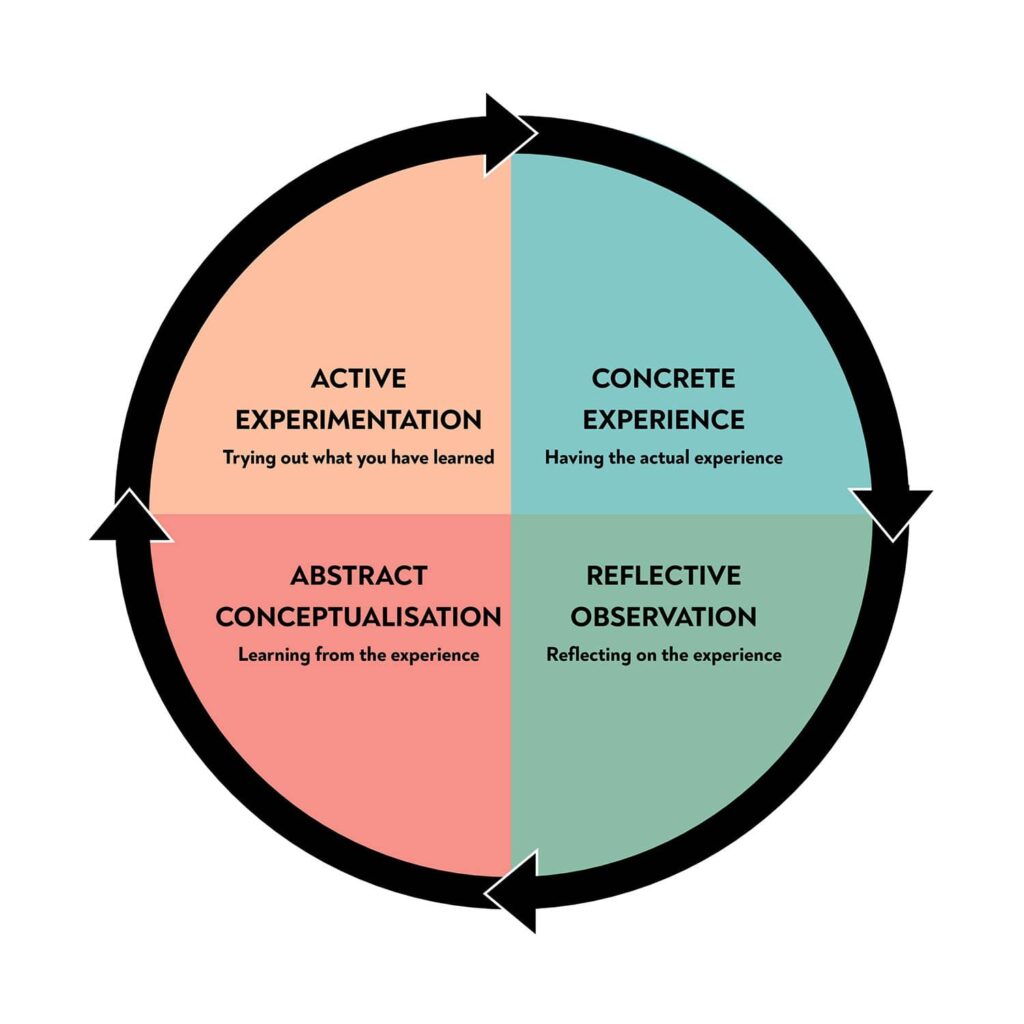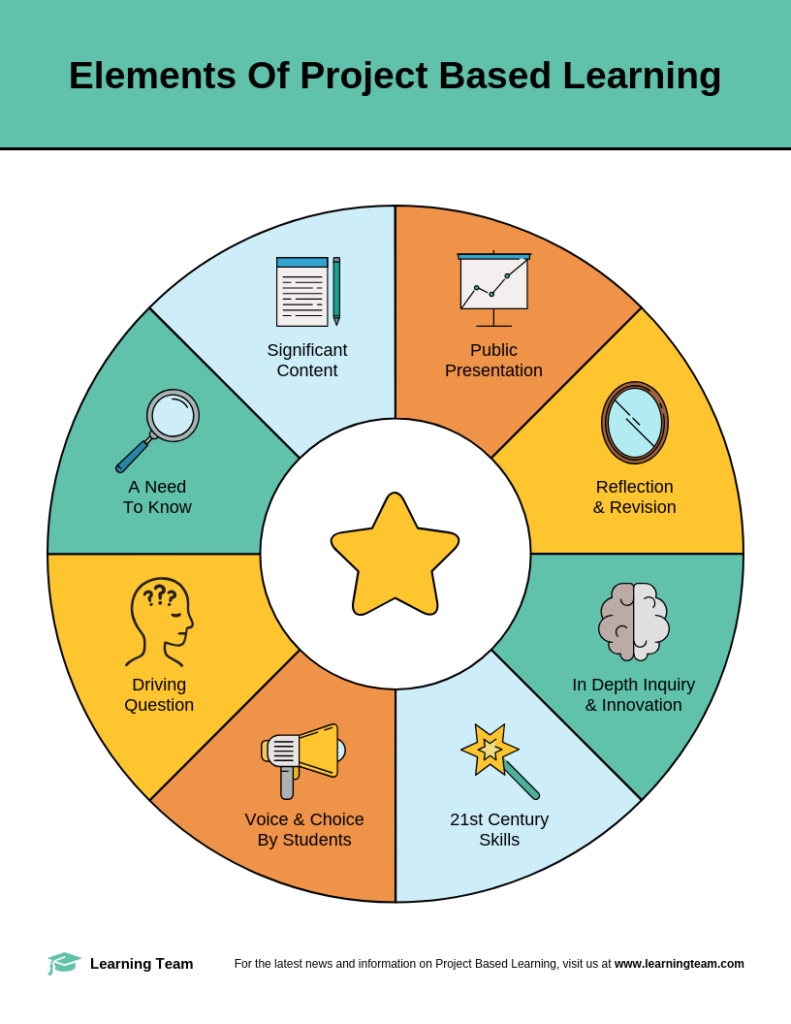Experiential Learning
Experiential Learning is an approach that, as outline by Queen’s University, incorporates:
“…direct experience and focused reflection in order to increase knowledge, develop skills, clarify values, and develop people’s capacity to contribute to their communities”
(What is Experiential Learning, n.d.)
Although David A. Kolb is considered the father of Experiential Learning (Kolb, 1984), this concept of learning through doing can be followed back to the days of ancient Greece, where the distinguished philosopher, Aristotle wrote in his book, Nicomachean Ethics, “for the things we have to learn before we can do them, we learn by doing them” (Aristotle, 350 B.C.E./1994).
Fast forward a few centuries and a few more influential figures, the commonly referenced framework for Experiential Learning is now the Kolb Learning Cycle (McLeod, 2017). This cycle combines the sequential acts of having a concrete experience, engaging in reflective observation of the experience to form abstract conceptualisations, and finally, active experimentation through applying the newly acquired skills and generalizations to other situations. Altogether, this framework fosters an immersive and interactive learning experience that cultivates an authentic, personal and transformative understanding of a given topic.

“Learning is the process whereby knowledge is created through the transformation of experience”
(Kolb, 1984, p.38)
Project-based Learning
An example of Experiential Learning is the application of Project-based Learning. Project-based Learning, as described in an article by PowerSchool (2021), is an instructional approach that allows learners to cultivate a deep appreciation of a given topic through completing projects cantered around real-world problems. The journey and real-world association of this pedagogical approach is what leads to enriched skills and knowledge. To explore the elements of Project-based learning and review some examples, visit one teacher’s insightful blog post (Abdo, 2020).

Experiential Learning’s Applicability
Currently, I am participating in an educational course that is asking its students to create an interactive learning design resource, for which my group has chosen the topic of the lobes of the brain. Although I agree with Kolb’s approach, and its various interpretations, such as Project-based Learning, I don’t believe that it would be the most applicable learning style for our interactive resource. I feel as though to fully reap the benefits of Experiential Learning, students should have two things: an appropriate amount of time to move through each stage of Kolb’s cycle carefully and fluidly, and a higher level of synchronous interactivity between students to expand their perspectives and form more informed conclusions, both of which are characteristics that I am not confident our medium can afford due to time and technology constraints. Furthermore, I don’t believe that this learning style would be the most appropriate approach, because when learning about the brain, unless working in a laboratory, most experiments would be theoretical and abstract, which contradicts the notion of learning through doing.
All things considered, I find the work of Kolb, and those before and after him, to be quite marvelous, however, like every pedagogical approach, Experiential Learning has a proper place and time for when it should be applied.
References
Abdo, R. (2020, June 2). 10+ Project based learning examples for educators. Venngage. https://venngage.com/blog/project-based-learning-examples/
Anonymous. (June 14, 2021). Project-based learning: benefits, examples, and resources. PowerSchool. https://www.powerschool.com/blog/project-based-learning-benefits-examples-and-resources/
Aristotle. (1994). Nicomachean ethics (W. D. Ross, Trans.). (Original work published 350 B.C.E.)
[Diagram of Kolb Learning Cycle]. Retrieved October 6, 2022, from https://www.simplypsychology.org/learning-kolb.html
[Elements of Project Based Learning]. Retrieved October 6, 2022, from https://venngage.com/templates/education/elements-of-project-based-learning-teaching-aid-e770d1e1-9f34-4e7d-a3db-4280927e52bd
Kolb, D. A. (1984). Experiential learning: Experiences as the source of learning and development (Vol. 1). Englewood Cliffs, NJ: Prentice-Hall.
McLeod, S. (2017). Kolb’s learning styles and experiential learning cycle. Simply Psychology. https://www.simplypsychology.org/learning-kolb.html
Good overview of experiential and project-based learning approaches! Effective use of visuals. I like how you made the quotes stand out! In the spirit of continuous improvement (for future blogs :)), you may want to think about how you would make your visuals accessible. One of the ways is to provide an image description as text. It would also be helpful if you could share more real-life examples of how the Kolb Learning model can be used in a classroom.
I think it is still possible to teach your course using an experiential learning approach. Probably, not this time, but it could be cool to design a course on how the brain works in Virtual Reality, for example :).